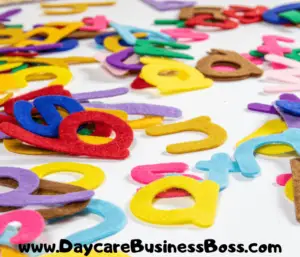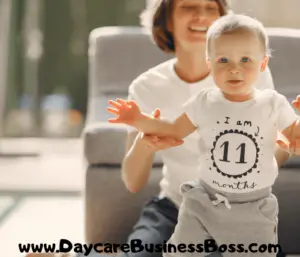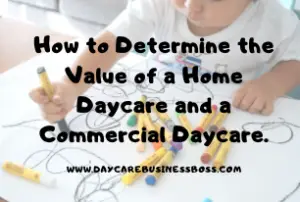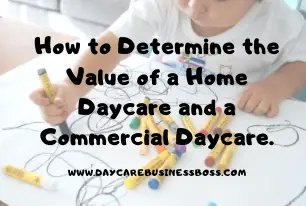If you have a knack for childcare and have ever thought about starting your own daycare center, there are ultimately two paths that you can choose between when getting started. You can choose to start a home daycare, or you can find a facility and start a commercial daycare center.
What will your daycare be worth? In a lot of cases, the value of any business often lies somewhere within its financial statements, its tangible assets, and other factors like its geographic location and reputation.
There are many ways that you could break down the numbers and come to a conclusion on how much your daycare is worth. While there is no “right” way to find your valuation, understanding all of the following information and using it will help you most effectively determine the value of your business.
Understanding Your Financial Statements.
There are three primary financial statements that every company has:
-
- The balance sheet.
- The income statement.
- The statement of cash flows.
When determining the value of your daycare, whether it be a home daycare or a commercial one, you are going to want to focus mainly on the components of the balance sheet and the income statement.
The Balance Sheet.
The balance sheet will break down all of your business’s assets as well as all of the liabilities. Tally up all of your assets, subtract any debt that the business has, and that will give you a good starting point for determining the value of the business as a whole.
Think of the balance sheet as a snapshot of what your business is worth right now. Your final valuation will factor in projections for the future and other variables that will change with time, but the balance sheet is a great starting point for determining the value of your business right this second.
The Income Statement.
Businesses will also often be valued based on numbers that you can find within the income statement. The value could be based on the company’s revenue or other financial ratios like a company’s P/E ratio.
 If you have enough data from past years for your daycare, you can take a look at the revenue that you have been able to bring in and likely project how much revenue you can expect to earn in the years to come.
If you have enough data from past years for your daycare, you can take a look at the revenue that you have been able to bring in and likely project how much revenue you can expect to earn in the years to come.
With that information, you could do more research to find out how much revenue other similar businesses to yours are generating, and then how much your daycare would be valued at based on those earnings.
Different industries will usually have different general rules for how much a business is worth relative to its sales. For example, in one industry a business might generally be worth two times its sales.
Remember that in all reality, a business is worth whatever someone else would be willing to pay for it. Sometimes you will see businesses get acquired for way more or way less than what they were valued at.
A company’s P/E ratio is also often used as a measurement of whether the company is undervalued, overvalued, or at a fair price.
The P/E ratio simply takes the price of a company’s stock and divides it by the earnings that the company is making per share.
In other words, the P/E ratio for a publicly-traded company shows how much investors are willing to pay for $1 of earnings from that company. A high P/E ratio tells you that a business is overvalued.
Looking at Your Tangible Assets.
Your balance sheet should give you an idea of your business’s assets. However, the balance sheet will only give you a dollar amount of what your assets are worth at one particular moment in time.
When it comes to valuing your daycare center, it is worth it to consider the actual characteristics of your tangible assets, most notably the characteristics of the facility itself.
In a commercial daycare center, real estate is going to play a vital role in valuing the business. The amount of square footage that the facility has, as well as all of the supplies and equipment that are already in place, can be counted toward valuing the company.
On the other hand, if you have a home daycare center, the business is likely to be worthless because the home, equipment, and other supplies might belong to you rather than belonging to the business.
You have to be careful not to overvalue your business by mixing your own assets with the business’s assets.
Going Beyond the Numbers.
When it comes to the value of your business, financial statements can be a good tool for  looking objectively at the number and coming to an answer for how much your business is worth.
looking objectively at the number and coming to an answer for how much your business is worth.
However, some aspects of your business are a little bit less tangible than your revenue dollars and real estate, and they should still be counted into the valuation of your business.
This can include things like your business’s geographic location, branding, intellectual property, and its reputation in general. Some of these things will still be noted in the financial statements, but that doesn’t always paint the full picture.
Geographic Location.
First and foremost is the geographic location of your business, especially with a daycare. If you were to start a daycare anywhere where the population is lower, and there are little to no homes in the area, then that daycare center is going to be less valuable than one that is in a more densely populated area.
The geographic location of your daycare will also determine how much it is worth based on the cost of living in that area, the salaries or wages that people in that area are earning, and so on.
Think of it as indirectly affecting the lifestyle of your target audience. Daycares often provide value to parents that are working multiple jobs, during the day, and need childcare throughout the course of the day. Not to mention that the customers are actually parents in the first place.
Some areas are going to be more likely to have a lot of parents in this type of situation than others. Some higher-end places might be a better fit for nanny services, while other areas may just not have a lot of parents around.
All of these factors will play a role in the value of your business.
How much room do you need? Check out our article HERE.
Intellectual Property.
A company’s intellectual property is often reflected on the balance sheet, but the balance sheet does not always paint the full picture. Some people might value certain intellectual property differently than other people would and for different reasons.
What is intellectual property? In essence, it is any creative work to which the business has rights. For example, patents, trademarks, and copyrights are all considered intellectual property, as well as designs like logos.
If a business has any intellectual property that inherently makes it safer, smoother, or more efficient to run that business, then it will be more valuable as a business. The financial statements might reflect a number that is based on what the cost of the intellectual property was to be created, but the value of that property can often far exceed what was spent on it.
Branding and Reputation.
Similarly, a business’s branding and reputation can play a vital role in how valuable that company is. Branding and reputation are usually not directly reflected in any financial  statements, but odds are that they will indirectly impact the financial statements because customers will not do business with companies that have very bad reputations.
statements, but odds are that they will indirectly impact the financial statements because customers will not do business with companies that have very bad reputations.
If you are running a daycare with incredibly friendly staff, a top-of-the-line environment that is safe for the kids, and an all-around great reputation, then your daycare is going to be more valuable than it would be with mediocre staff, and an okay environment.
Even if the building is the same, the wages are the same, and the pricing for the services is the same. Poor quality service will always result in a less valuable business.
Related Questions.
Q: Is it worth it to start my own daycare?
A: As with any business or venture, there are a lot of factors to consider when deciding whether or not it is worth it to start. If childcare is something that you are good at and passionate about, and you can start a daycare in an area where there is a demand for it, then it should be worth it for you to start. Just know that it will take up time, energy, and you will be responsible for it.
Q: What are the benefits of starting a daycare?
A: Starting a daycare might be one of the best ways to actually give back to your community. Most businesses today are started to solve a particular problem, and parents needing childcare is one that isn’t going away. Starting daycare can help your community in many ways, including economically by allowing parents to maintain their jobs, and keep money coming into the community.
Q: What is the best way to exit a daycare that I started?
A: You can sell a daycare in a very similar manner to how you would sell any other business. Determine what the value of the business is and then look to see if there are any buyers. You could also exit by transferring the ownership to someone else.

Please note: This blog post is for educational purposes only and does not constitute legal advice. Please consult a legal expert to address your specific needs.
To learn more on how to start your own daycare checkout my startup course and documents here.

Meet Shawn Chun: Entrepreneur and Childcare Business Fan.
I’m a happy individual who happens to be an entrepreneur. I have owned several types of businesses in my life from a coffee shop to an import and export business to an online review business plus a few more and now I create online daycare business resources for those interested in starting new ventures. It’s demanding work but I love it. I do it for those passionate about their business and their goals. That’s why when I meet a childcare business owner, I see myself. I know how hard the struggle is to retain clients, find good employees and keep the business growing all while trying to stay competitive.
That’s why I created Daycare Business Boss: I want to help childcare business owners like you build a thriving business that brings you endless joy and supports your ideal lifestyle.


